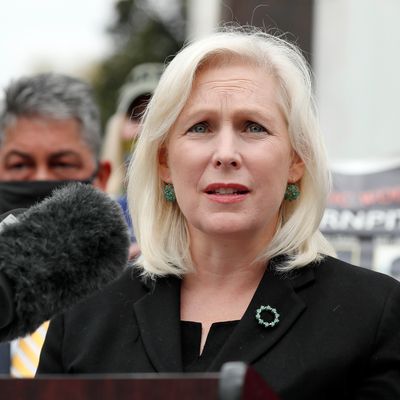
Two years after lawmakers were “coming out of the woodwork” to be briefed about Navy and Air Force pilots coming across unidentified aerial phenomena, a bipartisan group of senators led by New York Democrat Kirsten Gillibrand wants to formalize the process of learning about the unexplained sightings more commonly known as UFOs.
Earlier this month, Gillibrand introduced an amendment to the National Defense Authorization Act to establish an ‘‘Anomaly Surveillance and Resolution Office,” which will have the authority to investigate “any resource, capability, asset, or process of the Department and the intelligence community.” The proposal, which is being debated this week in the Senate, was co-sponsored by Republican senators Lindsay Graham and Marco Rubio, who was an outspoken advocate of UFO transparency when he was chairman of the Senate Select Committee on Intelligence. It would also establish an “aerial and transmedium advisory committee,” which would include academics from throughout the country in addition to experts from NASA. While House lawmakers have suggested a similar office, the Senate version would require frequent public reports about sensitive information, like whether or not there have been any adverse health effects linked to UAP sightings and if the government collected any physical materials from the encounters.
In an interview with Politico on Wednesday, Gillibrand described her motivation for the new office. “If it is technology possessed by adversaries or any other entity, we need to know,” she said. “Burying our heads in the sand is neither a strategy nor an acceptable approach.” Her thinking is consistent with the findings from the Pentagon’s underwhelming UAP report this summer, which found no concrete evidence for the phenomena, but encouraged lawmakers and Defense and intelligence officials to take the matter more seriously at an administrative level. “We’ve not had oversight into this area for a very long time,” Gillibrand added. “I can count on one hand the number of hearings I had in ten years on this topic. That’s fairly concerning given the experience our servicemembers have had over the last decade.”






























